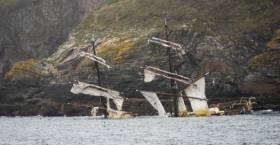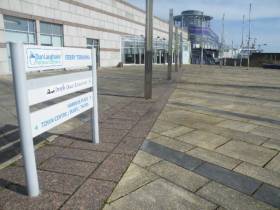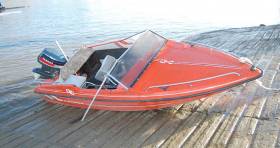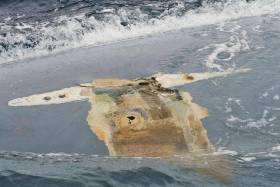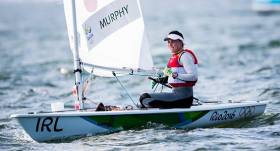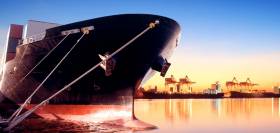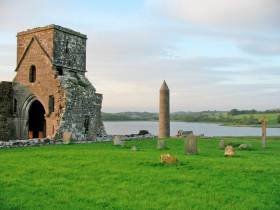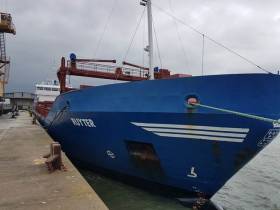Displaying items by tag: Courts
Kinsale Lifeboat Volunteer Jailed On Drugs Charges
One of the Kinsale RNLI volunteers honoured for their role in the rescue of 30 crew from the tall ship Astrid in July 2013 has been jailed for seven years on drug distrubution charges.
As The Irish Times reports, Liam O’Connell was sentenced to 10 years with three suspended after pleading guilty to possession of cannabis, cocaine and MDMA for sale or supply at his home just over a year ago.
At sentencing, the judge said O’Connell has exploited his status in the Kinsale community as an RNLI volunteer to participate in the drugs trade.
The Irish Times has more on the story HERE.
The developer behind scrapped plans for the Harbour Innovation Campus in Dun Laoghaire is taking legal action against a tech investor, as The Sunday Times reports.
Philip Gannon filed a High Court case last Wednesday (14 November) against Ian Lucey and his firm Lucey Technology citing “specific performance”, which is often an attempt to compel a party to fulfil contractual obligations.
Neither party would comment on the case, though it is understood to be separate to Gannon’s withdrawal of his Harbour Innovation Campus plans from Dun Laoghaire last month in the absence of a foreshore licence for the earmarked St Michael’s Pier site.
Previous to that, in September, Lucey wrote in a blog post on Medium that he had moved to “step back” from the project “as [Philip Gannon’s] Blond Capital undertook more management, in line with [Lucey Fund’s] model of being a small shareholder in a number of businesses.”
The Sunday Times has more on the story HERE.
Note: This piece has been corrected to remove a previous statement that Philip Gannon and Ian Lucey were business partners. The shareholder agreement clearly states that no partnership was created. We are happy to make this clarification.
Connemara Salmon Farm Freshwater Plans To Face High Court Review
#FishFarm - Permission granted for a salmon farm to extract water from a Connemara lake is facing a judicial review, as the Connacht Tribune reports.
An Bord Pleanála recently greenlit plans by Bradán Beo Teo, the region’s biggest producing salmon farm enterrprise, to extract fresh water from Loch an Mhuilinn for cleaning and disease treatment purposes after the company was previously blocked by Galway County Council.
But now local environmental activists are behind a proposed High Court review of the way the planning board arrived at its decision.
The Connacht Tribune has more on the story HERE.
#Speedboat - A man has been sentenced to six years in prison for the manslaughter of a woman who died after his speedboat crashed in London three years agp.
According to The Guardian, Jack Shepherd (31) was absent from sentencing at the Old Bailey after skipping bail, and police currently have a warrant out for his arrest.
The jurors heard that in December 2015, Shepherd took his date Charlotte Brown (24) to his speedboat on the River Thames while both were under the influence of alcohol, and allowed her to drive the vessel at “full throttle”.
The boat crashed into a submerged log before capsizing and throwing both Shepherd and Brown into the river.
Brown showed symptoms of hypothermia and cardiac arrest when she was recovered from the water, and was pronounced dead later.
Neither Brown nor Shepherd was wearing a lifejacket, and Shepherd — who had previously been pulled over a number of times for speeding on the river — admitted in a police interview that he did not inform Brown, who had no boating experience, about the safety devices on board.
Police also said the speedboat itself had a number of defects, including a ‘wobble’ in its steering.
Mail Online has video recorded by Brown on her phone of part of the pair’s speedboat trip, in which she can be heard commenting that Shepherd was “going so fast”.
Judge Richard Marks QC, in his sentencing remarks, said Shepherd had a “totally cavalier attitude to safety”. The Guardian has more on the story HERE.
Suspended Sentence For ‘Cheeki Rafiki’ Yacht Boss
#CheekiRafiki - The director of the yacht company that operated the Cheeki Rafiki — which sank in the Atlantic four years ago, claiming the lives of its four crew — has been given a suspended sentence over the incident, as The Guardian reports.
Douglas Innes of Stormforce Coaching Ltd was convicted last year of failing to ensure the safety of the vessel which was lost in the Atlantic in May 2014.
James Male, Andrew Bridge, Steve Warren and Paul Goslin were lost at sea after their yacht lost its keel amid poor weather around 700 miles off Nova Scotia while the four were returning to the UK from Antigua.
In sentencing, the judge said that cost-cutting at Innes’ business had contributed to the loss of the crew and their vessel, which had not been inspected and did not comply with licences.
Innes, 43, was acquitted at retrial of the manslaughter of the four men.
The Guardian has more on the story HERE.
A pub row over Olympic sailing and Irish medallist Annalise Murphy ended with a baseball bat attack and a narrowly avoided jail sentence.
As Independent.ie reports, Dublin Circuit Criminal Court heard that Patrick O’Reilly struck Frank Shannon with the weapon after he was jeered for his support of “minority sports” at Tallaght’s Kiltipper Inn on 6 August 2016.
Defending barrister Gaby Dean BL told the court that her client “saw red” at the ridicule and left the pub to retrieve the bat, which which he assaulted Shannon.
Independent.ie has more on the story HERE.
Irish Water Prosecuted Over Lime Discharge & Fish Kill In River Varty
#FishKill - Irish Water pleaded guilty to the discharge of deleterious matter to the River Vartry one year ago, at a sitting of Bray District Court this past Tuesday (20 February).
The offence related to the accidental discharge of lime from their water treatment facility at Roundwood, Co Wicklow.
Roisin O’Callaghan, fisheries environmental officer with Inland Fisheries Ireland (IFI), told Judge Kennedy that, on 21 February 2017, IFI received a call that there had been an accidental spill of lime at the water treatment plant.
On investigation, O’Callaghan confirmed that the spill had resulted in a fish kill for approximately 500 metres downstream from the discharge.
A series of water samples were taken and analysis confirmed that the lime spill had altered the pH in the receiving water, resulting in the death of approximately 100 fish.
Irish Water co-operated fully with IFI’s investigation and initiated an immediate clean-up of the site.
Eoghan Cole BL, representing Irish Water, stated that following the clean-up, the Environmental Protection Agency had completed a dye survey on the drainage network to confirm that only clean surface water was discharging to the River Vartry.
Judge Kennedy commented on the significance of the River Vartry in supporting Atlantic salmon, sea trout, brown trout and lamprey.
Irish Water were fined €500 with costs and expenses amounting to €6,937.65.
State Broke EU Rules Over Seafarer Qualifications Says High Court
#Training - A marine notice issued earlier this year on accreditation for seafarers qualifications has “no legal basis” and must be quashed, says the High Court.
According to The Irish Times, the court has also directed Transport Minister Shane Ross to recognise British-accredited seafarer training provided in Ireland.
The judgement detailed that the Marine Survey Office was in breach of several EU regulations in failing to approve sea survival refresher courses provided by the likes of Cork Harbour’s National Maritime College of Ireland, which are accredited by Britain’s Maritime and Coastguard Agency.
In addition, the European Commission has given Ireland two months to comply with EU law regarding the mutual recognition of qualifications for seafarers.
The Irish Times has more on the story HERE.
Murder Charge Over Woman’s Death In Lough Erne This Past April
#LoughErne - BelfastLive reports that a man has been charged with the murder of a woman whose body was found in Lough Erne earlier this year.
Lu Na McKinney was recovered from the water by emergency services in the early hours of Thursday 13 April.
As previously reported on Afloat.ie, the 35-year-old mother of two from Donegal was believed to have slipped from the deck of a boat while checking it was tied to the jetty.
Yesterday a PSNI spokesperson confirmed that a 41-year-old man had been charged with her murder and was due before Omagh Magistrates’ Court this morning (Tuesday 5 December).
The man is also charged with possession of a Class C controlled drug, a classification which includes a number of tranquilisers.
Captain Fined Over Negligence After Cargo Vessel Grounding
#Shipping - The captain of a cargo ship that ran aground on Rathlin Island last week has been fined £1,000 over his negligence at the helm, as the Belfast Telegraph reports.
The MV Ruyter, which was en route from Russia via Denmark and Scotland, sustained extensive damage to the front of its hull after running aground on the north side of Rathlin Island on the night of Tuesday 10 October.
However the damage was not noted till the vessel arrived at Warrenpoint in Carlingford Lough the following afternoon.
At a sitting of Armagh Court, Judge Paul Copeland found that Aleksandr Iakovotsov had broken international shipping codes over failure to keep a lookout to judge risk of collision, and a separate charge of failing to provide sufficient lookout “during the hours of darkness”.
The Belfast Telegraph has more on the story HERE.



























